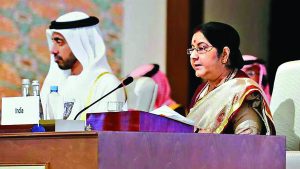 Despite the 57-member Organisation of Islamic Cooperation (OIC) passing a resolution on Kashmir during the March 1 session of its Council of Foreign Ministers at the UAE capital Abu Dhabi, ignoring India’s well-known stand on the K question, the 50-point Abu Dhabi Declaration was free from this embarrassing factor for India. The OIC has been routinely coming out with anti-India resolutions on Kashmir on Pakistan’s pressure and, therefore, there was nothing new in what it did. What was significant was the negotiated and unanimous declaration on the conclusion of the OIC’s 46th session which kept the K word aside.
Despite the 57-member Organisation of Islamic Cooperation (OIC) passing a resolution on Kashmir during the March 1 session of its Council of Foreign Ministers at the UAE capital Abu Dhabi, ignoring India’s well-known stand on the K question, the 50-point Abu Dhabi Declaration was free from this embarrassing factor for India. The OIC has been routinely coming out with anti-India resolutions on Kashmir on Pakistan’s pressure and, therefore, there was nothing new in what it did. What was significant was the negotiated and unanimous declaration on the conclusion of the OIC’s 46th session which kept the K word aside.
This might have been in deference to Indian External Affairs Minister Sushma Swaraj’s participation in the plenary session of the strategically significant 50-year-old OIC at Abu Dhabi as the Guest of Honour. It was a major victory for India’s diplomatic drive to be represented at a gathering of representatives from Muslim-majority nations as a matter of right despite Pakistan’s vehement opposition. At last,
India’s claim of being home to the world’s second largest Muslim population has got established. With this, Indian diplomacy has added another significant feather to its cap. UAE Foreign Minister Abdullah bin Zayed Al Nahyan, who extended the invitation to India in his country’s capacity as the host nation, made it clear that a “friendly country of India has been named as the Guest of Honour in view of its great global political stature as well as its time-honoured and deeply rooted cultural and historical legacy, and its important Islamic component.”
Welcoming the UAE gesture, which came after concerted consultations involving the OIC’s key members like Saudi Arabia, India said, “We see this invitation as the desire of the enlightened leadership of the UAE to go beyond our rapidly growing close bilateral ties and forge a true multifaceted partnership at the multilateral and international level.” India considers it as a “milestone in our comprehensive strategic partnership with the UAE”.
The OIC invitation, the first such development after the organization came into being in 1969 as a “collective voice of the Muslim world”, has special significance since the first such gesture to India asking for sending an official delegation to the Islamic Summit Conference (as it was then called) in Rabat, Morocco, in September 1969, got cancelled at the 11th hour following Pakistan’s aggressive anti-India lobbying. Senior Congress leader Fakhruddin Ali Ahmed, who later became India’s President, had already reached Morocco to take part in the conference, but could not do so and had to come back disappointed.
The Rabat fiasco led to the straining of India’s relations with Morocco as well as Jordan owing to Rabat succumbing to Islamabad’s pressure and “on account of Jordan’s attitude towards India’s participation” in the conference. India ultimately withdrew its Ambassador from Rabat (Morocco) and its Charge de’affaires from Amman (Jordan).
But the world today is not what it was at that time. India now has emerged as the world’s fastest growing and third largest nation in terms of purchasing power parity and the sixth largest economy so far as the GDP is concerned having an impeccable track record on different fronts. The growth cake is being shared by all sections of the population, including Muslims, the second largest religious group in the country. It would be, therefore, unfair to ignore
India by any grouping which has a Muslim or Islamic tag to it.
The announcement regarding the OIC’s invitation to India was simultaneously made on February 23 from Abu Dhabi and New Delhi “as a welcome recognition of the presence of 185 million Muslims in India (as per the official figures) and of their contribution to its pluralistic ethos, and of India’s contribution to the Islamic world”.
However, unofficially, India had already been sounded about it, making it clear that New Delhi should get ready to participate in the inaugural plenary of the 46th session of the Council of Foreign Ministers of the OIC as the Guest of Honour on March 1-2. This was done to prevent India’s opponents (Pakistan, to be specific) from making much fuss about it as the entire Muslim world had a view contrary to that of Islamabad.
A proposal for the OIC’s invitation to India as an observer was made last year too by Bangladesh, but it failed to bring about the desired result. Since the OIC this time had made up its mind in this regard after much consultations among its influential members, the killing of 40 CRPF personnel in a terrorist attack at Pulwama (J and K) and the developments that followed had no impact on it.
Pakistan’s open demand for cancelling the invitation to India too failed to affect the decision of the UAE. Of course, the OIC, on Pakistan’s request, summoned an emergency meeting of its Kashmir Contact Group at its General Secretariat in Riyadh and expressed its concern over the heightened tension between India and Pakistan, and called for immediate de-escalation in the region. But, as reports suggest, this was done as a mere formality so that nothing came in the way of India’s participation in the OIC foreign ministers’ conclave.
It has been generally noticed that every OIC session leads to a statement on Kashmir, embarrassing for India. The responsible grouping of Muslim-majority countries can contribute significantly to easing tensions in South Asia and elsewhere if it refuses to see things with a jaundiced eye, remaining unaffected by pressures from any quarters.
The time has come for the OIC to think dispassionately and come out with a view not favouring any nation, even if it happens to be a Muslim-majority one. It should go by what it sees as the truth so that its suggestions are taken with the deserving seriousness. The OIC should try to use all the clout it has so that sanity prevails everywhere in the world and human blood is not shed on any pretext.
The OIC’s voice may carry enhanced appeal if it starts speaking openly against extremism and terrorism of all forms and persuasions as any activity involving violence, leading to wars, only complicates the issues concerned. A resort to the use of military muscle or terror tactics has never solved any problem anywhere in the world. What happened in Afghanistan and countries in the Middle East should serve as the recent best example to come to the conclusion that wars can never help solve a problem.
Diplomacy and dialogue have been found to be far more effective than the use of violent means to settle even a festering dispute. Such a process, a peaceful one, can take time, but it will ultimately bring about the desired result. The US, the sole surviving super power, now prefers using diplomacy, mostly its coercive variety, to settle disputes and ease tensions. One can notice this in the cases of North Korea, Iran, Turkey and countries in West Asia.
Nowadays the US is busy holding talks with the Taliban in Afghanistan so that Washington can withdraw its remaining 14000 troops from the war-ravaged country and create an environment for the Taliban’s participation in the government in Kabul. The US has spent billions of dollars and lost the lives of hundreds of its well-trained soldiers with the objective of eliminating the Taliban, but without success.
Therefore, the OIC should use its diplomatic skill to mediate between India and Pakistan to get the issues involved settled with a view to ensuring peace in the region. There is need to create an environment so that the entire humanity, including those living in South Asia, home to a vast number of the world’s poor, develop a stake in peace and progress.
letters@tehelka.com













